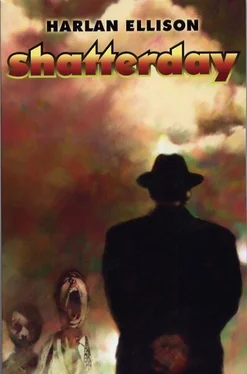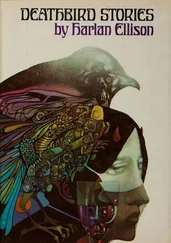The shoppe was silent.
Pressure from outside came through the walls. Cancerous darkness lapped at the stasis field.
The Supervisor sighed. It was never easy. But neither was survival.
The grubby young man had taken only one more step when he heard the voice behind him. “Hey! You!”
He turned. The shoppe that had been gone a moment before, was back again. Appear, disappear, appear again…
He stopped. The young woman with the long blonde hair was standing in the open doorway, motioning to him urgently. “Hey, come on back. He sold you the wrong stone.”
He hesitated. The powerstone was warm in his hand. Unnaturally warm. It was beginning to be uncomfortable.
He turned and walked back. She was extraordinarily beautiful. She held out the octagonal stone he had wanted to select before the old man made him buy the diamond-shaped one. “Better take this one,” she said, smiling up at him with affection. Then a shadow came over her face, her eyes seemed to darken as though she saw something disturbing, and then the smile was strong again. “This is the one you want.”
“Where’s the old man?” he asked.
“He was just minding the place for me; just a replacement. He’s always making some kind of stupid mistake. We want our customers to be satisfied; better take this one.”
He handed her the diamond-shaped stone, now almost unbearably hot. He took the octagonal stone. It was cool and seemed to radiate power. Yes, this was the right one.
“I still want to know,” he said, “what do you get out of this? Who are you, how do you make a living in a place like this?”
“Just serving the community and the commonweal, that’s the only reward we get. A force for good in your time.” Her smile was fixed, implacable, eternally sincere. Caveat emptor.
She held the diamond-shaped stone that would have killed him the first time he tried to use it, and she stared at him with her alabaster smile, and she knew what forces had been set in motion by his ownership of the stone that would make people do what he wanted them to do. And she thought of the thousand in their vaults, now one thousand and one. She thought of friend Lhayne and his Ahna who would remain in their vaults perhaps until the universe was reborn, because there was no one who had the spare time to buy them their time. And she wanted the young man to go away and begin fulfilling the destiny that would produce antientropic energy by hastening the onrush of the Infinite Dark Mass.
“Is there anything else?” she asked.
“He wrote down my name.”
“Yes. That’s just company policy. So we have a record.”
“Who sees that record?”
“No one, Mr. Manson. That’s just for our files.”
“He wrote Charles. That’s not right. It’s Charlie. Can you change it?”
“We won’t have to. It’s all right.”
He started to walk away. “It’s Charlie; don’t forget.”
There was Art, and there was survival, and sometimes they were mutually exclusive.
The voice came from a swirling matrix of white mist that twisted inside the shoppe. We won’t forget. And the door slammed. And the shoppe was gone. And the grubby young man turned once more onto Jamshyd Avenue; and was, in a moment, a part of the crowd, and a part of the Infinite Dark Mass.
With a grateful nod to the writings
of Michael Moorcock.
All the Lies That Are My Life
Introduction
Art, someone said, is meant to clarify and elucidate complex experience.
This story is intended as clarification and elucidation. The topic under discussion is friendship. As I warned earlier in these pages, this is the long one that forms the core of the collection. It is 22,300 words in length, and it has taken me about twelve years to write it. No, I don’t mean I’ve spent the last twelve years working on this piece to the exclusion of all others… I mean it’s been perking and getting itself born for that long. I knew bits and pieces of it a long time ago; but other parts I simply wasn’t old enough or self-aware enough to understand.
I’m not saying I’m any smarter now than when I first went at this idea. What I am saying is that some stories refuse to let you at them until they’re sure you know what the hell you’re doing.
(Later on in this book there’s a story I wrote before it was ready to be written. I’ve included it because it’s a recent work and I want it in print; but before this book makes the transition from copyedited manuscript to galleys I’ll try to thrash the bejeezus out of that story in hopes I’ve learned enough in the last two years to make it come right. If not, you’ll read a crippled thing. I don’t have to tell you which one it is: you’ll know.)
This is my most recent writing. It tries to deal with just what we mean when we say of someone else, “He’s my friend.”
One time I was arrested and canned for being an “outside agitator” in Valdosta, Georgia. I was not alone; there were quite a few other “outside agitators” who also got swept up by the Laws. But I suppose it was my assertion that I could not possibly be an “outside agitator” because I was a member of the human race, a citizen of the world, just another link in the chain, that prevented me from paying the fine like the others, and being carted to the state line for instant dispersal. They decided to hold me for a few days, just to teach me a lesson.
And sitting there in the Valdosta slam, I complained to the innkeeper that I hadn’t eaten all day and I. d like something plain and downhome. After he stopped laughing he advised me that brunch had long since been served and that I’d have to wait till that night for the sumptuous county-provided meal.
In the next cell was an old man who’d been hauled in for pissing on some woman’s garden. He never told me why he’d taken it upon himself to nourish the flora in that way.
He dug around in his pockets and came up with a half-eaten Power House candy bar. He offered it to me, and I took it. There was no reason why he should have done that, but he did it, and I thanked him. Several times I thanked him.
For a few minutes there in Valdosta, Georgia, that old man was my friend.
Another time, just recently, a man who had been a close friend for eight years, who had assured me that when and if I needed his assistance he would be there, who had always talked a very courageous talk, who came to my home and who shared meals with me, who acted (in all ways that required no demonstration of risk) as if he were my friend… betrayed me in a court of law, while under oath, renouncing what he had said in sworn deposition… and all to the end of trying to cripple a lawsuit it took me four years of my life to get before a judge and jury.
The pain of listening to him dissemble, there in that courtroom, was infinitely greater than the pain inflicted on me by the original injustice, by the days, weeks and months I have lost trying to get justice, by the vast sums of money I have expended trying to counter powerful opponents. During the time he testified I felt the pain of watching a friend die. Despite his perfidy, I won… and won big.
I can only suppose he did it out of self-interest, out of lack of courage, out of fear. Nonetheless, I now realize he could never have been my friend.
So what is friendship?
My answers to that question are no more formidable than my answers to the questions what is love or what is art?
It redefines itself each time the question is confronted. But this I do think is true: there is an element of risk in friendship. It is a quality that defines itself in terms of love and loyalty as the readiness to inconvenience oneself at risk of something valuable. And that seldom means money. It means the skin goes on the line.
Читать дальше












